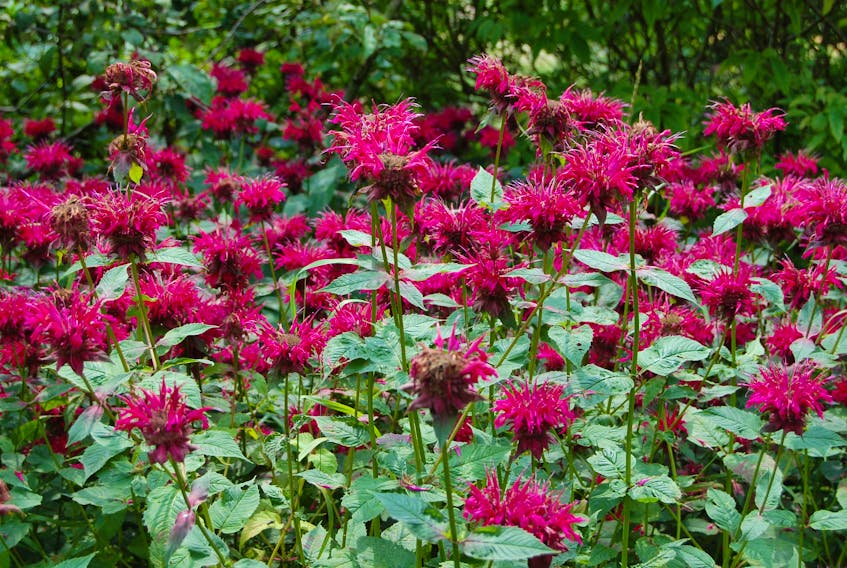Canada Day is just around the corner. What are you doing to celebrate?

With social distancing now a norm and municipal budgets diverting money to things more important than fireworks, why not create fireworks in your garden? Using the most outstanding displays of colour that will last from early summer onward. Perennial plants that just will not quit, attract pollinators, and will generate a longer sense of satisfaction than a mere shot in the dark.
Here are our top picks for the best show this summer in your garden. We have selected perennial plants (come back year after year) that are in bloom now or will be very soon. Most flower for an extended period. Plant a few and celebrate this great country with us.
Filipendula (Filipendula rubra)
Mark calls this his “candy floss” plant. It is that much fun. The bright pink or red blossoms look like whipped sugar in candy colours. Grows to about 80 cm tall, thrives in the sun, and attracts butterflies to beat the band. Hardy to zone 5.
Astilbe, (Astilbe japonica)
‘Lollypop’, while we are on a confections theme, why not a plant that spouts a colourful bloom that resembles the spire on a country church. Inspiring! Loves partial shade. East side of house is best. Does not like to dry out so keep out of direct afternoon sun. Super winter hardy to zone 3. The variety ‘lollypop’ is just one of many that are worthy of your attention while shopping for perennials this time of year.
Bee Balm (Monarda)

Bubblegum blast is bright “bazooka” pink. Blooms right through late summer into early fall, about eight to 10 weeks. 60 cm tall. Hardy to zone 4. Bees, of course, love it as do many other natural pollinators. Bee balm spreads by root. While we would not classify it as invasive, it does move through your garden. Dig and divide every three to five years.
Cardinal Flower (Lobelia cardinalis)
If we were creating a list of our favourite hummingbird plants, this would be at the top. An amazing, native flowering plant that blooms for up to six weeks. Bright red. Over a meter high. Zone 4. Sun or partial shade.
Black-Eyed Susan (Rudbeckia hirta)
The famous, long season, brilliant yellow bloomer with the “black” eye. The ‘goldsturm’ variety has become the gold standard for a whole generation of Canadian gardeners. Grows to 60 cm tall and looks stunning planted en masse in beds of five, 10 or more. Blooms through early fall, for up to 10 weeks. What is not to love? Sun. Zone 4.
Tickseed (Coreopsis hybrid)
‘Zesty zinger’. Ignore the unfortunate common name and plant this variety of tickseed for bright pink colour in your garden right through to mid fall. 40 cm tall, loves the sun. Butterflies love it too. Don’t limit your selection to the new pink ‘zesty zinger’ (we like the name for a Canada Day celebration). Speaking of celebrations, look for white flowering ‘big bang galaxy’ and yellow flowering ‘big bang star cluster’. Hardy to zone 5.
Hosta ‘Bridal Falls’ (Hosta)
You don’t likely think of hosta as a great flowering plant, but hummingbirds do. ‘Bridal falls’ is sun tolerant (won’t bleach out like many hostas do) and features a green/white variegated leaf. Like all hostas, it is drought tolerant, therefore low maintenance, and clumps nicely, lending itself to digging and dividing every five years or so. Zone 3.
Hosta ‘seducer’ and hosta ‘striptease’. Just to prove that plant hybridizers are not a bunch of prudes, along come a couple of hosta varieties that conjure up some out-of-the-box images. Both varieties flower for an extended period, to late summer. ‘Seducer’ is green/yellow and ‘striptease’ is green/gold. Sun/shade, zone 3.
Our garden fireworks may be a bit slow compared to the real thing, but they more than make up for it by performing for a very long time.
Mark Cullen is an expert gardener, author, broadcaster, tree advocate and Member of the Order of Canada. His son Ben is a fourth-generation urban gardener and graduate of University of Guelph and Dalhousie University in Halifax. Follow them at markcullen.com, @markcullengardening, and on Facebook.









